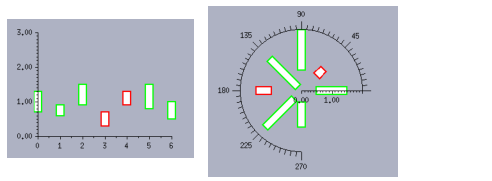High-Low Bar Displayer
A high-low bar displayer has the following basic characteristics:
Class | |
Category | Single |
Inherits from | |
Number of real data sets displayed | 2 |
Can be used with all types of projections | Yes |
Items drawn | High-low bar items  |
As with the high-low displayer, the high-low bar displayer displays two data sets. The first data set is composed of the low values and the second data set is composed of the high values. A high-low bar item is drawn between each pair of low-high values, the low values being taken in order from the first data set and the high values being taken in order from the second data set.
High-Low Bar Displayers in a Cartesian Chart and in a Polar Chart illustrates the fact that a high-low bar displayer can be used with all types of projections. Data sets are represented by a high-low bar displayer in a Cartesian chart (using a Cartesian projection) and in a polar chart (using a polar projection).

High-Low Bar Displayers in a Cartesian Chart and in a Polar Chart
We can use the high-low bar displayer displaying the white high-low bar items outlined in green and red as an example. We can create this displayer by using the following code:
IlvPalette* risePal = dpy->getPalette(dpy->getColor("white"), dpy->getColor("green"),0,0,0,0,2); IlvPalette* fallPal = dpy->getPalette(dpy->getColor("white"), dpy->getColor("red"),0,0,0,0,2); IlvHiLoBarChartDisplayer* displayer = new IlvHiLoBarChartDisplayer(IlvChartDisplayerWidth, risePal, fallPal); |
Note: By default, the high-low bar items are outlined with the foreground color of the defined rise and fall palettes and are filled with the background color of these palettes. The high-low bar items will be displayed only with the outline if the Drawn Filled property is set to IlvFalse. |
Published date: 05/24/2022
Last modified date: 02/24/2022





